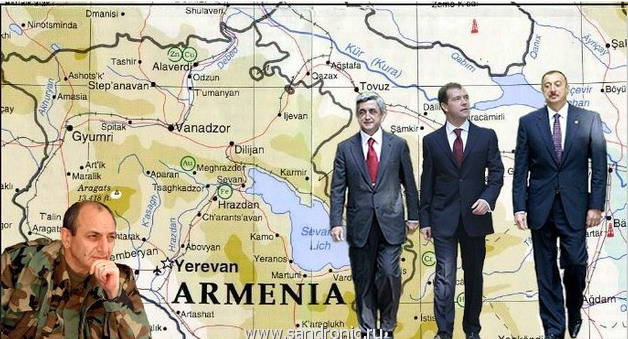Economy and politics in solving the Karabakh issue

Over the past 17 years, a very fragile peace has been preserved in Nagorno-Karabakh. As is known, the de jure Nagorno-Karabakh Republic is part of Azerbaijan, but in fact it has long been living its own life. At the same time, the overwhelming number of ethnic Armenians live on the territory of the NKR, who, for obvious reasons, do not want their territory to be managed from Baku. In Nagorno-Karabakh, for a long time already exist their own bodies of de facto state power, which are working to ensure that the world community recognizes the independence of the Republic.
Today there is a working agreement, according to which Armenia and Azerbaijan, with the active mediation of Russia, are conducting an open dialogue about the future of Nagorno-Karabakh. However, despite the constant meetings of the leaders of these states and other contacts at a high level, so far there can be no talk about any further progress on the future fate of the NKR. Why? Yes, the fact is that both Armenia and Azerbaijan stand in their positions, as they say, to death. The Armenian side speaks of international law, in particular that every nation in the world has the right to self-determination. Residents of Nagorno-Karabakh have long been determined and want to live in an independent state. Azerbaijan advocates that any state on the planet should preserve its integrity. And since NKR is part of Azerbaijan, then splitting into two states is unacceptable for Baku. The Azerbaijani side claims that it is ready to grant Stepanakert the widest autonomy, but within Azerbaijan.
These polar positions are difficult to reduce to a common denominator. In this situation, the mediation of Russia can play a paramount role. However, this matter, as everyone understands, will be extremely difficult. So, what can Moscow offer to its CIS colleagues in such a situation? On the one hand, it is necessary to try to take into account the interests of both Armenia and Azerbaijan, but there is another side - their own reputation in this region. Russia's own interests, of course, are stability in the territory of the Transcaucasus. It can be considered unequivocal that in the event of a resumption of hostilities in Nagorno-Karabakh, the situation will also increase in the North Caucasian republics of Russia itself. And then there is Georgia, with its desire to resume control over Sukhumi and Tskhinval. In general, if you do not set yourself the goal of implementing the softest political maneuvering, then problems can not be avoided.
Recall that in the early nineties, the military conflict in the NKR led to numerous victims and the expulsion of the Azerbaijani population from the territory of the autonomy. Many Azerbaijanis have lost their homes and, no doubt, wish to return to their historical homeland to live in peace and harmony. But is it possible to achieve peace if the fighting still remains 17 years ago. At the same time, an entire generation has already managed to grow in the NKR territory, which does not understand how to live under the same roof with Muslim Azerbaijan. The situation is close to stalemate.
With great prejudice look at the resolution of the Armenian-Azerbaijani conflict and other countries in the region. First of all, it is Iran and Turkey. However, these countries occupy almost polar positions. The Turks actively support Baku and do not intend to consider the claims of Armenia for Azerbaijan to give NKR independence. Iran, in turn, is not so closely connected with Baku and, in principle, would not mind if a piece of territory broke away from Azerbaijan.
What is beneficial for Moscow in this situation? In connection with the latter the news from Azerbaijan, the authorities of this country wish to make their state part of the gas transmission system, which will bypass Russia. It turns out that if Russia stands for the preservation of the territorial integrity of Azerbaijan, then it will de facto lose in gas disputes. Obviously, the unequivocal support of Baku from Moscow is certainly not what the Kremlin can do. At the same time, Armenia at this stage maintains a much more pragmatic position in relations with Russia, which means that it deserves support to a greater extent than Azerbaijan. In addition, the army of Yerevan is much more assembled and trained than the army of Azerbaijan, which, with all its strength, managed to lose in 1994 the war of the army of the Nagorno-Karabakh Republic.
It turns out that for Russia the bloodless separation of NKR from Azerbaijan would be beneficial. And if there is such a benefit, then the process needs to be implemented. The situation with the NKR branch can be fully utilized for its own purposes, putting pressure on Baku if Ilham Aliyev really decides to actively participate in the Nabucco project to bypass Russia with a gas pipe. Here, any outside support for Azerbaijan can no longer compare with what it can lose from the confrontation with Moscow.
In general, any attempts to resolve the situation unilaterally, as Georgia tried to do at 2008, can end not only with the rapid separation of Stepanakert from Baku, but also with a large-scale conflict in the region. To prevent this, it is necessary to develop a position that will suit all parties to the smoldering conflict. At the same time, the position should also be profitable for Russia. If the brotherhood of nations is out of the question for a long time, then in a situation of world crisis for their loyalty one can and should demand dividends. The market is the market ... The best bonus from such a strategy is a long-term investment that will bring not only economic but also geopolitical income.
Information